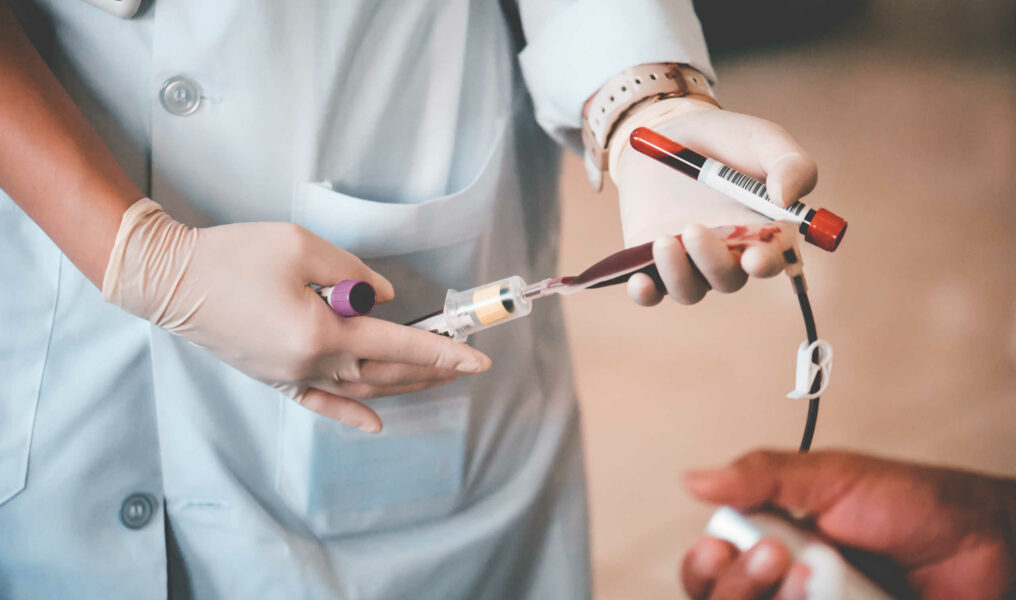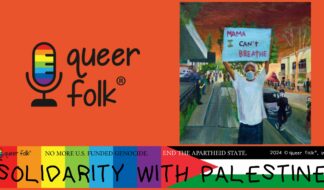The Need is Great
Only about 38 percent of the U.S. population is eligible to donate blood. That's because of various restrictions like age and physical health of the potential donor plus factors intended to protect the blood supply from blood-borne pathogens such as HIV. Men who have had sex with men within the past three months are among those who are ineligible — a deferral period recently reduced from a wait of one year. This change was announced in early April and it comes at a time of greatly increased need for donated blood due to the coronavirus pandemic, as so many blood drives had to be canceled. Many in the LGBTQ community find deferral policies related to blood donation arbitrary and homophobic in general. Dave Garcia, executive director of the Affirmations LGBTQ community center in Ferndale is among them, and he was quick to call the policy "asinine."
"It doesn't make any sense," Garcia said. "It is arbitrary. It's an archaic, asinine policy that is steeped in bigotry and prejudice and ignorance. And frankly, any time you have a … health policy with that kind of prejudice and ignorance associated with it, [it] leads to death. People are dying because of this stupid policy," he said, implying that lives might be saved by ending the acute blood shortage if the deferral policy were abolished.
To be clear, it is the Food and Drug Administration that establishes guidelines regarding blood donation, not organizations like the American Red Cross, which is not a government agency. An official from the Red Cross declined to be interviewed for this story, instead they emailed a statement from national headquarters dated April 2. The statement expressed thanks to the FDA for updating the rules regarding men who have sex with men, among other recent changes to their policies.
"These changes will potentially allow more individuals to donate and help ensure blood collection organizations across the country continue to meet patient needs throughout this pandemic and beyond," the statement reads. "… This is the first and important step toward a greater goal of an equitable blood donation process that treats all potential donors with equality and respect, and [it] ensures a safe, sufficient blood supply is readily available for patients in need. The Red Cross remains committed to building an inclusive environment that embraces diversity for all those who engage with our lifesaving mission…"
Orientation Versus Behavior
While the statement specifies that the Red Cross "does not believe blood donation eligibility should be determined by methods that are based upon sexual orientation," Garcia says that is exactly what it does: it bases eligibility primarily on sexual orientation, not on the type of sexual behavior. For example, gay men in monogamous sexual relationships remain unable to donate, as do gay men who engage in sex that does not put them at risk for HIV.
"Basically, what they're saying is that I can go have sex with a woman today, or a hundred women in a week, and I can go give blood," Garcia surmised. "If I have sex with one man, deal's over, whether you're on PrEP or not. If I'm a gay man on PrEP, who just got tested three months ago … you're one of the safest people to give blood, frankly. All that matters is [that] … you're gay. There's no other way to wrap your mind around that than discrimination and ignorance."
It should also be noted how rigorously blood banks screen donations for blood-borne diseases such as HIV, hepatitis and syphilis. At the same time, none of these tests are 100 percent accurate, and they can produce faulty results. For example, despite current restrictions and testing of approximately 12 million units of blood donated each year, 10 HIV-infected units have slipped through, according to data provided by the Human Rights Campaign.
Garcia has personal experience with attempting to donate blood and being turned away. It was after the 9/11 tragedy when a lifetime ban against gay men from donating blood was in effect. It was revised to a one-year deferral in 2015. At that time, Garcia said he was aware of the policy.
"I told them then it was a stupid policy and that I had just had an HIV test — I even brought my test with me," Garcia said. "And it wasn't enough. I was turned away from giving blood."
He pointed out that ironically, after 9/11 the need for blood was not nearly what had been anticipated because there weren't many survivors.
A Plea to the FDA
Garcia's not alone in his frustration. He has the backing of hundreds of doctors and other medical professionals who signed an open letter to the FDA dated April 16 calling on them to overturn the "scientifically outdated ban against MSM blood donors."
Further, "…we are on the precipice of a critical nationwide shortage of blood products," it reads. "This severe shortage could be alleviated if antiquated restrictions lacking scientific data were responsibly lifted. According to a 2014 study by the Williams Institute at UCLA School of Law, eliminating the MSM ban would result in an estimated 360,600 MSM donors being able to donate an additional 615,300 pints of blood per year."
With HIV testing that is now nearly 100 percent sensitive to the virus, the window period of infection has been narrowed to approximately 10 days from the time of infection, according to data cited in the letter. However, it should be noted that the window depends on the type of test, as described by the Centers for Disease Control and Prevention. Again, like Garcia, the signers of the open letter to the FDA emphasize the difference between sexual orientation and sexual behavior.
"A broad ban against MSM blood donors does not take into account the actual risk behavior in question that could jeopardize blood supply safety — very recent condomless anal or vaginal intercourse with a partner with HIV viremia — engaged by those regardless of sex, gender, and/or sexual orientation," the letter reads.
Instead of relaxing standards that would compromise the safety of the blood supply, they advocate for scientifically-driven standards that uphold its safety while promoting equity and ending discrimination in blood donation.
Likewise, 20 state attorneys general, including Michigan Attorney General Dana Nessel, signed a letter dated April 22 that pushed for a risk-based, gender-neutral screening model.
The medical director of Detroit's Corktown Health Center, a clinic focused on serving the LGBTQ community in Southeastern Michigan, weighed in as well.
"It would be OK for questions to be asked about sexual behavior so that there can be a risk stratification strategy," Dr. Latonya Riddle-Jones said via email. "This would require a new system, and creatively thinking outside of our current box. This new system would not create barriers for those [who] wanted to donate, but it could allow those testing [to keep] the blood supply as safe as possible."
In contrast to the U.S., Brazil, which has been especially hard-hit by the coronavirus, fully lifted its ban against MSM donating blood earlier in May. Likewise, Chile, Italy, Mexico and Russia are among several other countries that have no deferral period for MSM.
Updated, But Not Yet Implemented
The abovementioned Red Cross announcement stated that it, and presumably all blood banks, would work aggressively to implement the many eligibility changes outlined by the FDA as soon as possible, but that it will take time to implement.
Indeed, the new guidelines are not yet enforced systemwide; in fact, it was reported earlier in May that a state senator in New York who is gay was turned away from donating blood.
"I found, as a gay man, it was entirely insulting to be turned away by the New York Blood Center," Sen. Brad Holyman said. "The federal government is encouraging citizens to donate blood during this pandemic. The fact that I couldn't do so makes me feel like a second-class citizen. It's completely discriminatory. It's not based on science. It's insulting to LGBTQ people, and it sends a really negative message."
For his part, Garcia agreed that it sends the wrong message. Still, when asked if he would donate blood if the restrictions were lifted, he answered without missing a beat, "Of course I would."










